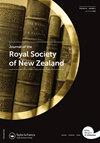The future of molecular ecology in Aotearoa New Zealand: an early career perspective
IF 2.1
4区 综合性期刊
Q2 MULTIDISCIPLINARY SCIENCES
引用次数: 2
Abstract
ABSTRACT The skills, insights, and genetic data gathered by molecular ecologists are pivotal to addressing many contemporary biodiversity, environmental, cultural, and societal challenges. Concurrently, the field of molecular ecology is being revolutionised by rapid technological development and diversification in the scope of its applications. Hence, it is timely to review the future opportunities of molecular ecological research in Aotearoa New Zealand, and to reconcile them with philosophies of open science and the implications for Indigenous data sovereignty and benefit sharing. Future molecular ecologists need to be interdisciplinary, equipped to embrace innovation, and informed about the broader societal relevance of their research, as well as advocates of best practice. Here, we present an ideal future for molecular ecology in Aotearoa, based on the perspectives of 23 early career researchers from tertiary institutions, Crown Research Institutes, research consultancies, and government agencies. Our article provides: a guide for molecular ecologists embarking on genetic research in Aotearoa, and a primer for individuals in a position to support early career molecular ecologists in Aotearoa. We outline our goals and highlight specific considerations – for molecular ecology and the scientific community in Aotearoa – based on our own experience and aspirations, and invite other researchers to join this dialogue.分子生态学在新西兰奥特罗阿的未来:一个早期的职业前景
分子生态学家收集的技能、见解和遗传数据对于解决许多当代生物多样性、环境、文化和社会挑战至关重要。同时,由于技术的快速发展和应用范围的多样化,分子生态学领域正在发生革命性的变化。因此,回顾新西兰奥特罗阿分子生态研究的未来机会,并将其与开放科学哲学以及对土著数据主权和利益分享的影响相协调是及时的。未来的分子生态学家需要跨学科,具备接受创新的能力,了解他们研究的更广泛的社会相关性,以及最佳实践的倡导者。本文基于23名来自高等院校、皇家研究院、研究咨询机构和政府机构的早期职业研究人员的观点,展望了奥特罗阿分子生态学的理想未来。我们的文章为分子生态学家在奥特奥特阿开展遗传研究提供了指南,并为支持奥特奥特阿分子生态学家早期职业生涯的个人提供了入门。基于我们自己的经验和愿望,我们概述了我们的目标,并强调了针对分子生态学和Aotearoa科学界的具体考虑,并邀请其他科学家加入这一对话。
本文章由计算机程序翻译,如有差异,请以英文原文为准。
求助全文
约1分钟内获得全文
求助全文
来源期刊

Journal of the Royal Society of New Zealand
综合性期刊-综合性期刊
CiteScore
4.60
自引率
0.00%
发文量
74
审稿时长
3 months
期刊介绍:
Aims: The Journal of the Royal Society of New Zealand reflects the role of Royal Society Te Aparangi in fostering research and debate across natural sciences, social sciences, and the humanities in New Zealand/Aotearoa and the surrounding Pacific. Research published in Journal of the Royal Society of New Zealand advances scientific knowledge, informs government policy, public awareness and broader society, and is read by researchers worldwide.
 求助内容:
求助内容: 应助结果提醒方式:
应助结果提醒方式:


